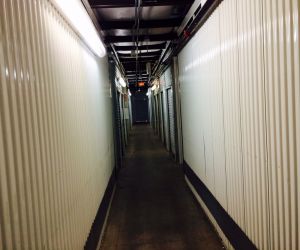Whole

There’s a wisp of a moon hanging over Sand City. On the other side of that dune, the Pacific comes to rest. But there’s no rest for me just yet. Public Storage closes at nine, and I’ve a half hour to make one more run from the hotel room. Heading back to Iowa with an operating theory of Seaside starting to form in my head, bin number 2159 is my pre-positioned cache of supplies.
Seaside and Sand City are easy towns to like. On one of the most gorgeous parts of the planet, there’s zero pretension. They are working cities, with authentic people of easy-going goodwill. I’ve been advised by more than one Midwest transplant that the pace is slower. I’ve always thought the landscape of a place guides the pace. From the frenzied, split second fortune and bust in the canyons of Wall Street, to the seasons gliding by on a Midwest farm to the ebb and flow of ocean waves; we take our cues from what’s around us.
Tonight, the slower pace theory is meeting the realities of capital. Capital is winning, as it tends to do. Sand City is a wonderful hodgepodge of live-work-create spaces and the rolled up doors of workshops are flooding light and workshop noise onto the street. Some peninsula matriarch wants to show off a new marble countertop for her holiday party and that can’t wait until daylight arrives. Some trust-funder has a brass-era car that needs a new hand-crafted fender and that can’t wait either. To walk down a Sand City street is to take a class in craftsmanship.
Back at the storage facility, pushing a cart-o-boxes through the corridors, the metaphor hammer clobbers me upside the head again, as it tends to do. The bins are lives, neatly sorted, waiting for their owners to arrive and reconnect with them. Actually, they are fractional lives, rented by the square foot. Some bigger, some smaller, some on the second floor. How much do you pre-position? How much do you leave behind?
Questions to ponder on the sturdy but slow elevator. There’s no - life again - one right answer. The quite professional young woman at the counter wanted to know if I wanted her to show me different bins before I signed up. “Do some have ocean views?”, I ask cheekily. A chink in the professional armor smile results, and thus I’m sure she gave me the sweetest seventy-five square feet available on the complex.
If you’re going to embark upon a city manager career, treat the storage professionals (ok, everyone) well. Don’t make them show you bin after bin, as if one could be fractionally better than another. Generalized reciprocity makes the world go round and you’ll never go wrong trying to make someone’s day a little easier, or a little more friendly. Bin 2159 could be bin 2160 or 2158. The supplies don’t really care what number they’re stored in. They’re just ritual objects to a fraction of life, resting at $113 a month.
Making the last run this morning, the fractions all come together. Amanda texts a picture. In this place where parts of lives are locked behind roll-up doors, a flood of life comes bursting through the iPhone screen. One of the most sacred superstitions at ISU is students DO NOT walk on a zodiac sign embedded in the floor just past the entry doors at the Memorial Union. To do so is to bring bad luck to your next test.
The zodiac is just past an entry door that thousands (tens of thousands?) of students pass through every day. It is big and near impossible to avoid. But they clog up traffic, clinging to the wall, avoiding it, lest they tempt the gods of forgotten answers on test day. Students, parents, siblings. They all avoid stepping on the zodiac. It is serious damn business.
Amanda texts a picture of her standing on the zodiac! She’s taken her last final exam and this thing she’s walked around for nearly four years no longer has any hold on her. She’s bundled up for the day, but she’s so strong and powerful and smiling in the picture. Standing astride the zodiac sign, hands on her hips, she has vanquished every test they put in front of her, and she knows there’s nothing this place has on her now.
My eyes start to water. In this cold, itinerant place, I take a seat on the concrete floor and trade texts with her, telling her how proud I am. How lucky am I? The best bin at the complex.
The best daughter a father could hope for.

